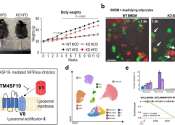Time-restricted eating vs. daily calorie restriction in reducing nonalcoholic fatty liver disease
Adults with obesity and nonalcoholic fatty liver disease did not see additional reductions in intrahepatic triglyceride while on a time-restricted eating regimen compared to subjects on a daily calorie-restriction diet. This ...








